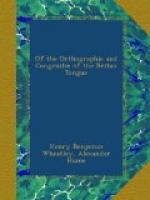8. To clere this point, and alsoe to reform an errour bred in the south, and now usurped be our ignorant printeres, I wil tel quhat befel my self quhen I was in the south with a special gud frende of myne. Ther rease, upon sum accident, quhither quho, quhen, quhat, etc., sould be symbolized with q or w, a hoat disputation betuene him and me. After manie conflictes (for we ofte encountered), we met be chance, in the citie of Baeth, w_i_th a Doctour of divinitie of both our acquentance. He invited us to denner. At table my antagonist, to bring the question on foot ama_n_gs his awn condisciples, began that I was becum an heretik, and the doctour spering how, ansuered that I denyed quho to be spelled with a w, but with qu. Be quhat reason? quod the D_octour_. Here, I beginni_n_g to lay my gru_n_des of labial, dental, and guttural soundes and symboles, he snapped me on this hand and he on that, that the d_octour_ had mikle a doe to win me room for a syllogisme. Then (said I) a labial letter can not symboliz a guttural syllab. But w is a labial letter, quho a guttural sound. And therfoer w can not symboliz quho, nor noe syllab of that nature. Here the d_octour_ staying them again (for al barked at ones), the proposition, said he, I understand; the assumption is Scottish, and the conclusion false. Quherat al laughed, as if I had bene dryven from al replye, and I fretted to see a frivolouse jest goe for a solid ansuer. My proposition is grounded on the 7 sectio of this same cap., q_uhi_lk noe man, I trow, can denye that ever suked the paepes of reason. And soe the question must rest on the assumption quhither w be a labial letter and quho a guttural syllab. As for w, let the exemples of wil, wel, wyne, juge quhilk are sounded befoer the voual with a mint of the lippes, as is said the same cap., sect. 5. As for quho, besydes that it differres from quo onelie be aspiration, and that w, being noe perfect consonant, can not be aspirated, I appele to al judiciouse eares, to q_uhi_lk Cicero attributed mikle, quhither the aspiration in quho be not ex imo gutture, and therfoer not labial.
OF RULES FROM THE LATIN.
Cap. 7. (sic.)
1. Heer, seeing we borrow mikle from the latin, it is reason that we either follow them in symbolizing their’s, or deduce from them the groundes of our orthographie.
2. Imprimis, then, quhatever we derive from them written with c we sould alsoe wryte with c, howbeit it sound as an s to the ignorant; as conceave, receave, perceave, from concipio, recipio, percipio; concern, discern, from concerno, discerno; accesse, successe, recesse, from accedo, succedo, recedo, w_i_th manie moe, q_uhi_lk I com_m_end to the attention of the wryter.
3. Also quhat they wryte w_i_th s we sould alsoe wryte with s; as servant, from servus; sense, from sensus; session from sessio; passion, from passio.
4. Neither is the c joined w_i_th s here to be omitted; as science and conscience, from scientia, conscientia; ascend and descend, from ascendo, descendo; rescind and abscind, from rescindo and abscindo.




